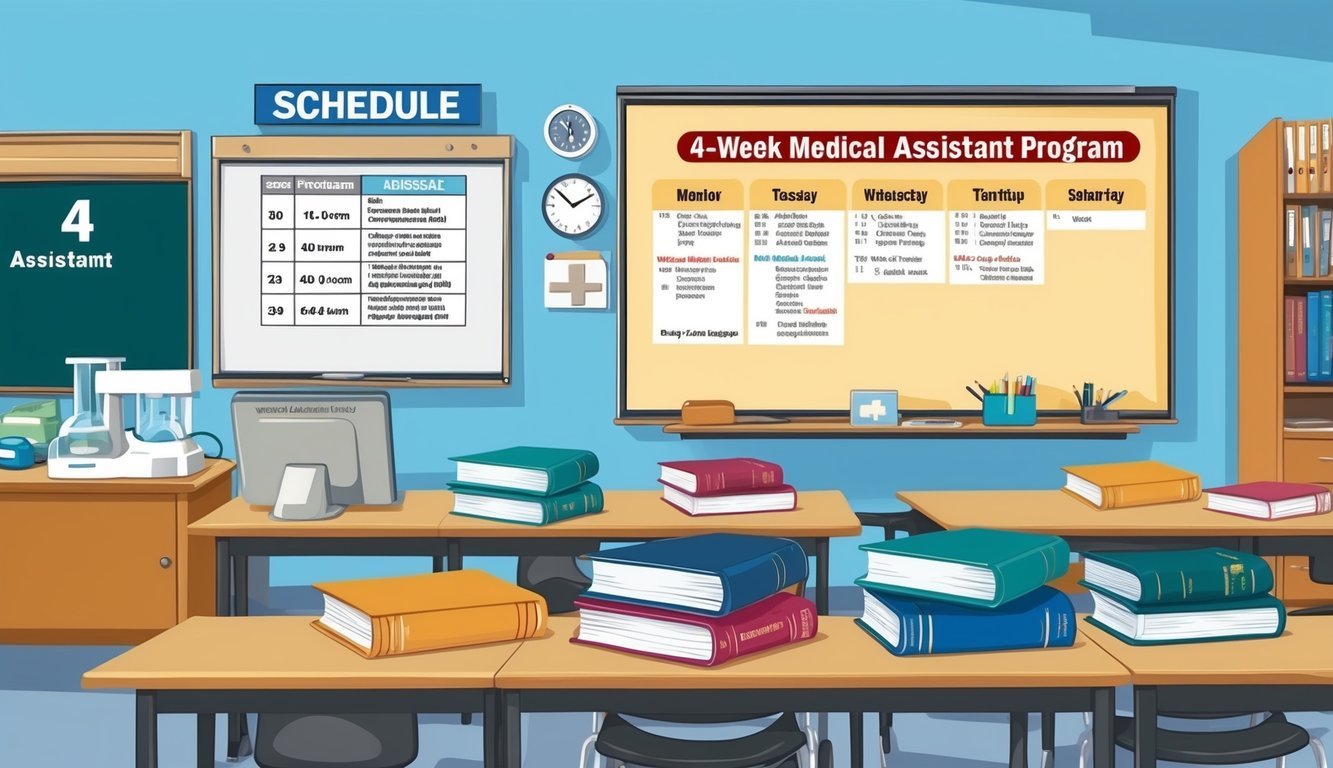In an ever-evolving healthcare landscape, the demand for trained medical assistants is on the rise, making programs to enter this field more crucial than ever. A 4-week medical assistant program can provide a fast track into this rewarding career by equipping you with essential skills needed for certification and practical experience. These accelerated medical assistant programs are designed for those looking to quickly transition into the workforce without compromising education quality.
Online medical assistant programs are particularly appealing, as they offer flexibility for busy individuals or those balancing other responsibilities.
Some institutions offer comprehensive training that adheres to industry standards, allowing you to complete your education on your own schedule while still gaining valuable knowledge relevant to your future role.
As you explore options, consider the benefits of various formats, from fully online courses to hybrid models that include hands-on training.
Investing in a 4-week medical assistant program can set you on the path to a fulfilling career in healthcare, enabling you to contribute effectively to patient care and support clinical teams.
By choosing the right program, you enhance your potential for employment in diverse medical settings, making it a smart decision for your professional future.
Understanding Medical Assisting

Medical assisting plays a vital role in the healthcare system, offering support in both clinical and administrative functions.
A clear understanding of the role and the various types of medical assistants will help you appreciate the importance of this profession.
Role and Responsibilities
As a medical assistant, you will perform a variety of tasks that are crucial for patient care and the efficient operation of healthcare facilities.
Your responsibilities may include:
- Clinical Duties: These involve taking patient histories, assisting with examinations, administering medications, and performing basic laboratory tests.
- Administrative Duties: You will handle tasks such as scheduling appointments, managing patient records, and processing billing information.
You will also need to become familiar with medical terminology since you will often interact with patients and healthcare professionals.
Additionally, the skills you gain in a medical administrative assistant online certificate program can enhance your proficiency in managing records and communication.
Types of Medical Assistants
There are generally two main types of medical assistants: clinical and administrative.
Understanding the distinction helps you determine your career path.
| Type | Description |
|---|---|
| Clinical Medical Assistant | Focuses on direct patient care tasks, working alongside physicians in clinical settings. Duties include obtaining vital signs, assisting during procedures, and educating patients about care protocols. |
| Medical Administrative Assistant | Primarily handles administrative tasks, such as organizing patient records, scheduling appointments, and managing billing processes. This role is crucial for ensuring smooth operations in healthcare facilities. |
Selecting the right path will depend on your interests in patient care versus administrative support.
Each type offers unique challenges and rewards in the healthcare environment.
Pre-requisites and Enrollment

Understanding the requirements for enrollment in a four-week medical assistant program is essential for prospective students.
The key areas to focus on are the educational requirements and the admission process.
Educational Requirements
To enroll in a four-week medical assistant program, you typically need at least a high school diploma or a GED equivalent.
Programs like those offered by the University of Texas at San Antonio may have specific prerequisites for their accelerated courses.
Additionally, institutions such as Pennco Tech and the University of the Incarnate Word might require completed coursework in related subjects for some of their programs.
Many programs prioritize candidates with a strong foundation in science and healthcare basics, so it’s beneficial to have relevant courses on your transcript.
If you are considering schools like the University of West Florida, checking their specific requirements will ensure you meet all criteria.
Admission Process
The admission process for a four-week medical assistant program can vary by institution but generally involves a few key steps:
- Application Submission: Complete the application form available on the school’s website.
- Documentation: Provide proof of your educational background, including transcripts and any necessary certifications.
- Interview: Some programs may require an interview to assess your readiness and commitment to the field.
Many institutions do not have strict application deadlines, which can be advantageous.
Always verify specific requirements with the school of your choice to ensure that you have all necessary documents in order for a smooth enrollment process.
Curriculum Overview

In a 4-week medical assistant program, the curriculum is designed to equip you with essential skills and knowledge.
The coursework typically emphasizes both core concepts and specialized training to prepare you for real-world clinical settings.
Core Coursework
Core coursework lays the foundation for your medical assisting career.
Key subjects often include:
- Anatomy and Physiology: Understand the human body systems and functions, crucial for effective patient care.
- Pharmacology: Learn about medications you may administer or assist with, covering dosages and side effects.
- Clinical Skills: Develop hands-on skills including taking vital signs, administering injections, and assisting with patient examinations.
Additionally, courses in medical terminology ensure you can communicate effectively within healthcare settings.
Engaging in practical exercises is critical, as it enhances your proficiency and confidence.
Specialty Training
Specialty training focuses on advanced skills tailored to specific roles.
This section may encompass:
- Phlebotomy: Gain knowledge of blood collection techniques, ensuring you can perform this task safely and efficiently.
- EKG: Understand electrocardiogram procedures, critical for monitoring heart health.
- Patient Care Protocols: Familiarize yourself with protocols for various clinical scenarios, enhancing your readiness for daily responsibilities.
This training prepares you for specialized roles in various medical environments, furthering your ability to meet patient needs effectively.
For more information on course specifics, consider exploring additional resources like Stepful.
Clinical Experience and Externships
Gaining practical experience is essential for your development as a medical assistant.
This section discusses the significance of internships and externships along with hands-on training in preparing you for a successful career in healthcare.
Internships and Externship Opportunities
Externships serve as a bridge between classroom learning and real-world application.
Many 4-week medical assistant programs include a clinical practicum that allows you to work directly in healthcare settings such as clinics and hospitals.
Typically, an externship may require around 160 hours of clinical practice.
This hands-on experience helps you develop practical skills while working with medical professionals.
Important factors to consider include:
- Length: Programs often allow for flexible scheduling.
- Placement: You’ll need support for finding externship opportunities tailored to your career goals.
Ensure your program provides adequate coordination for externships, giving you the opportunity to explore different specialties in healthcare.
Hands-On Training Aspects
Hands-on training is a critical component of your medical assistant education.
In a 4-week program, you may receive a mix of classroom instruction and practical training.
During this period, you can expect:
- Direct Patient Interaction: Engage with patients under supervision to enhance your communication skills.
- Clinical Skills Development: Learn essential procedures such as drawing blood or administering injections.
The training often includes real-time feedback from instructors, helping you refine your skills.
This experience not only boosts your confidence but also prepares you for various tasks you will encounter in your healthcare career.
Check programs like Stepful for insights on how externships enhance your learning experience.
Certification and Career Pathways
Understanding the importance of certification and career advancement is crucial for aspiring medical assistants.
This section covers how to obtain certification and the potential career pathways available to you.
Obtaining Certification
To become a Certified Medical Assistant (CMA), you must pass the CMA exam offered by the American Association of Medical Assistants (AAMA).
The exam covers various competencies, including clinical, administrative, and general areas of medical knowledge.
Alternatively, you can aim for the Certified Clinical Medical Assistant (CCMA) credential provided by the National Healthcareer Association.
This certification focuses more on clinical skills.
Here are some common steps to obtain certification:
| Step | Description |
|---|---|
| Complete a training program | Enroll in an accredited 4-week or longer program. |
| Gain supervised experience | Hands-on practice during clinical externships is essential. |
| Pass the exam | Register and pass the CMA or CCMA exam. |
Consider job placement assistance programs offered by many schools to help you enter the workforce.
Career Advancement
After achieving your certification, various career advancement opportunities await you.
Being a Certified Medical Assistant can pave the way to specialized roles or further certification in areas like phlebotomy or surgical assisting.
With experience, you can explore roles such as:
- Registered Medical Assistant (RMA): Requires passing the RMA exam and often involves more administrative duties.
- Clinical Supervisor: Overseeing medical assistants and ensuring efficient clinic operations.
Moreover, many employers offer programs for continuous education and training, which can enhance your skills and increase your potential for promotions.
Always stay informed about career development resources available through professional organizations to keep your qualifications current.
Professional Skills and Industry Tools

In the medical field, a successful career as a medical assistant requires a blend of administrative and clinical competencies along with proficiency in industry-specific technology.
Understanding these skills and tools is crucial for effective patient care and operational efficiency.
Administrative and Clinical Competencies
As a medical assistant, you will develop essential administrative skills such as billing and coding.
This ensures accurate patient invoicing and insurance claims.
Understanding medical billing practices is vital for maintaining financial accuracy within healthcare settings.
You will also gain clinical competencies.
For instance, mastering patient assessment techniques helps in evaluating patients’ health statuses accurately.
Skills in performing venipunctures for blood draws or assisting with laboratory procedures ensure you can gather laboratory specimens effectively.
Familiarity with infection control protocols is imperative.
This knowledge protects both you and your patients from potential health risks.
Certification in areas such as phlebotomy or as an EKG technician adds value to your skill set, enhancing your employability.
Technology in Healthcare
Technology plays a crucial role in modern healthcare.
Familiarity with Electronic Health Records (EHR) is essential.
EHR helps manage patient information securely and efficiently.
You must also understand compliance with HIPAA to uphold patient confidentiality throughout your work.
A growing number of programs offer online medical assistant courses or degrees.
This allows flexibility in your education.
Pursuing a clinical medical assistant online certification will strengthen your qualifications further.
You may also encounter tools such as telehealth platforms, which have become increasingly popular.
Knowing how to navigate these technologies will help facilitate remote patient interaction and care management, thereby improving healthcare access.
Investing in these skills and embracing technology will prepare you for a successful career as a medical assistant.

